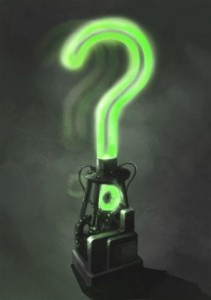
You know, we could be like every other gaming site and post things about horror games on Halloween. The fact is, however, that there is a true horror out there, one that permeates the gaming industry and is slowly KILLING YOU.
Ok, so by “killing you”, I mean killing a few of the cells on the tips of your thumbs from all the extra button presses. But it is little bits of death, hyperbolically KILLING YOU.
There is a trend in modern gaming, one that many have readily accepted as a matter of course, graciously accepting the empty satisfaction it offers. It silently calls to us, wrapped in the bright colors of achievements or trophies, or sometimes relying purely on its own addictive nature to lure in unsuspecting victims.
That trend… is collectibles. *SHUDDER* We’ll go more into this after the break.
Recently, I have been playing through the amazing Batman: Arkham City, and once I had completed the game, all that was left was for me to finish up a few side missions. One of these involves saving some hostages from the death traps of The Riddler, but each one is only available once you have collected a certain amount of Riddler trophies (shown above) and other various collectibles from various hidden locations and puzzles throughout the city. Even though the game provides a way to point out each of these collectibles on the map, it still requires that the player seek out over 400 points on the map, then locate that collectible in three-dimensional space, and most of the time, determine how to unlock it. The Arkham games give this a little life through the puzzles required to acquire them, but let’s take a step back here.
There are hundreds of these in Arkham Asylum, and over 400 in Arkham City, and these are just the Arkham games. Many of the top games all have some kind of collectible system in them: Gears of War, LittleBigPlanet, Assassin’s Creed, Grand Theft Auto, Street Fighter, Kingdom Hearts, and even many sports franchises all of collectible aspects to them, just to name a few. As these major franchises include this play style, many smaller games include it as well in an effort to emulate success, such as Transformers: War for Cybertron, Suikoden, Marvel Ultimate Alliance, and Sly Cooper. And of course, let’s not forget the king of “collecting them all”, Pokemon.
All of these games play on an aspect of human psychology that derives pleasure from collecting and completionism. Game companies incorporate this as a “side-game” in an effort to increase replayability, but many times it is an artificial sense of replayability at best. Sometimes a game will reward the collection with useful or interesting information, such as alternate endings, additional powers, or more content, but often there is no reward other than an achievement and an infinitesimally-increased sense of self-worth and accomplishment. I’m calling you out directly on this, Arkham City. Sure, the riddles unlock some pretty interesting back stories, and a few of the trophies unlock challenge maps, but most of them just unlock concept art.
For the record, concept art doesn’t count as a reward. Concept art NEVER counts as a reward.
So if you find yourself having completed a game and still going through to collect every little hidden object just for the sake of some empty reward or a few quilt squares of concept art that you will unenthusiastically view but once, stop. Take a step back and ask yourself if this is a worthwhile use of your time, when you could instead put that time to other use, like playing that game on your shelf you’ve been meaning to beat and never got around to.
Game developers, if you find yourself including a system of collectible objects with no more reward than an addition to some arbitrary achievement system, or the castoffs & table scraps of your art department, stop. Take a step back and ask yourself if this is a rewarding part of your game, when you could instead put that time to other use, like refining your game’s other gameplay systems, or correcting bugs & graphical inconsistencies.